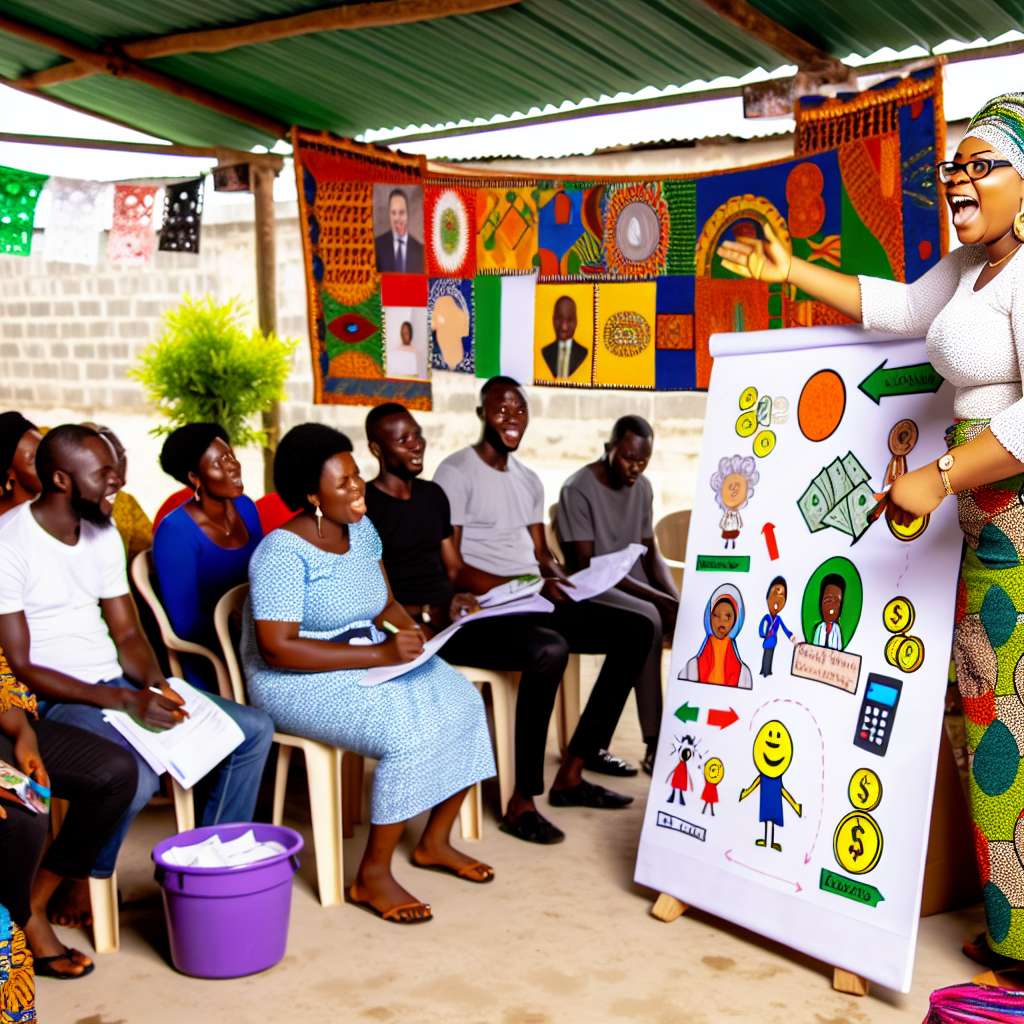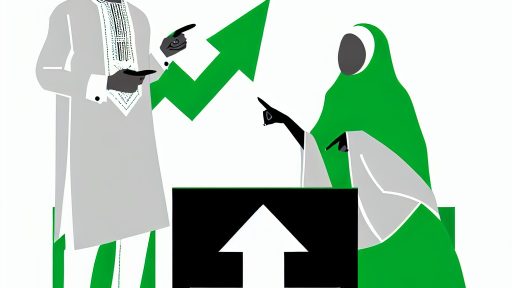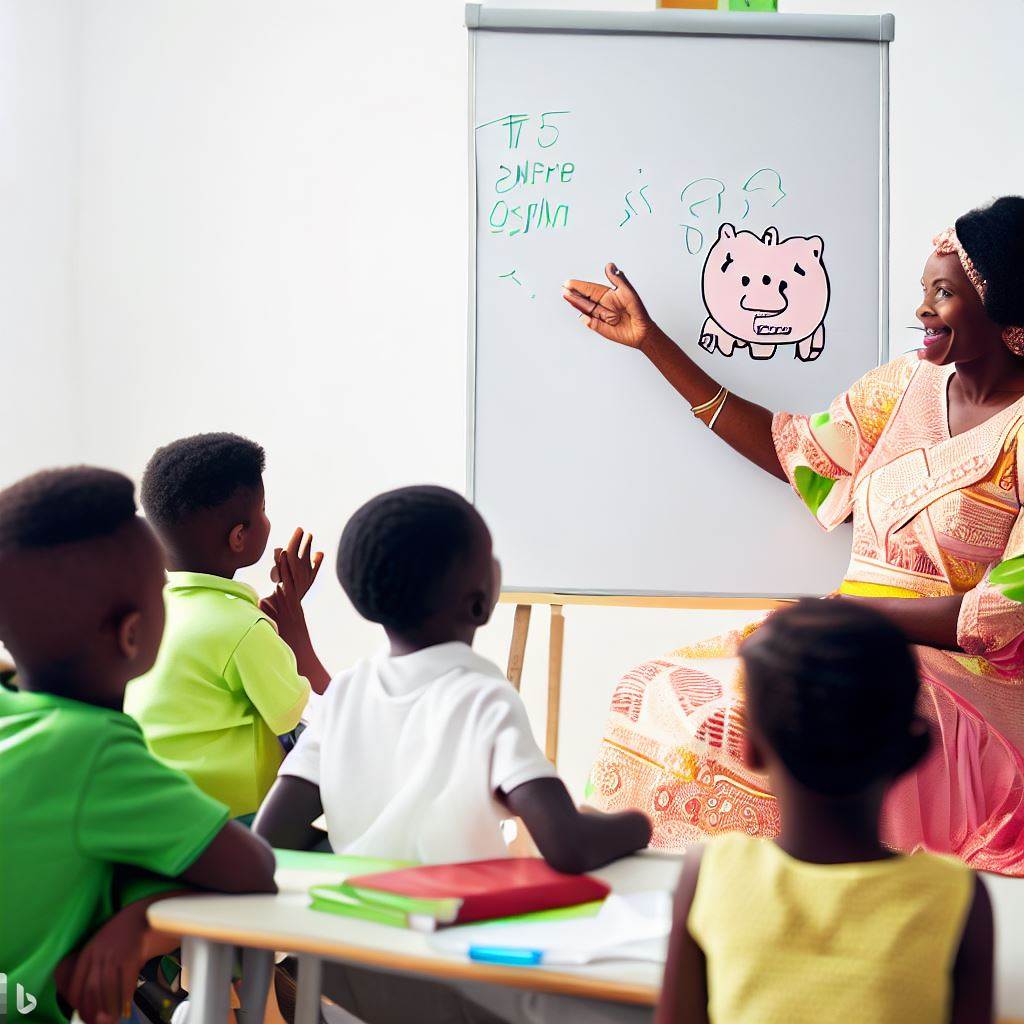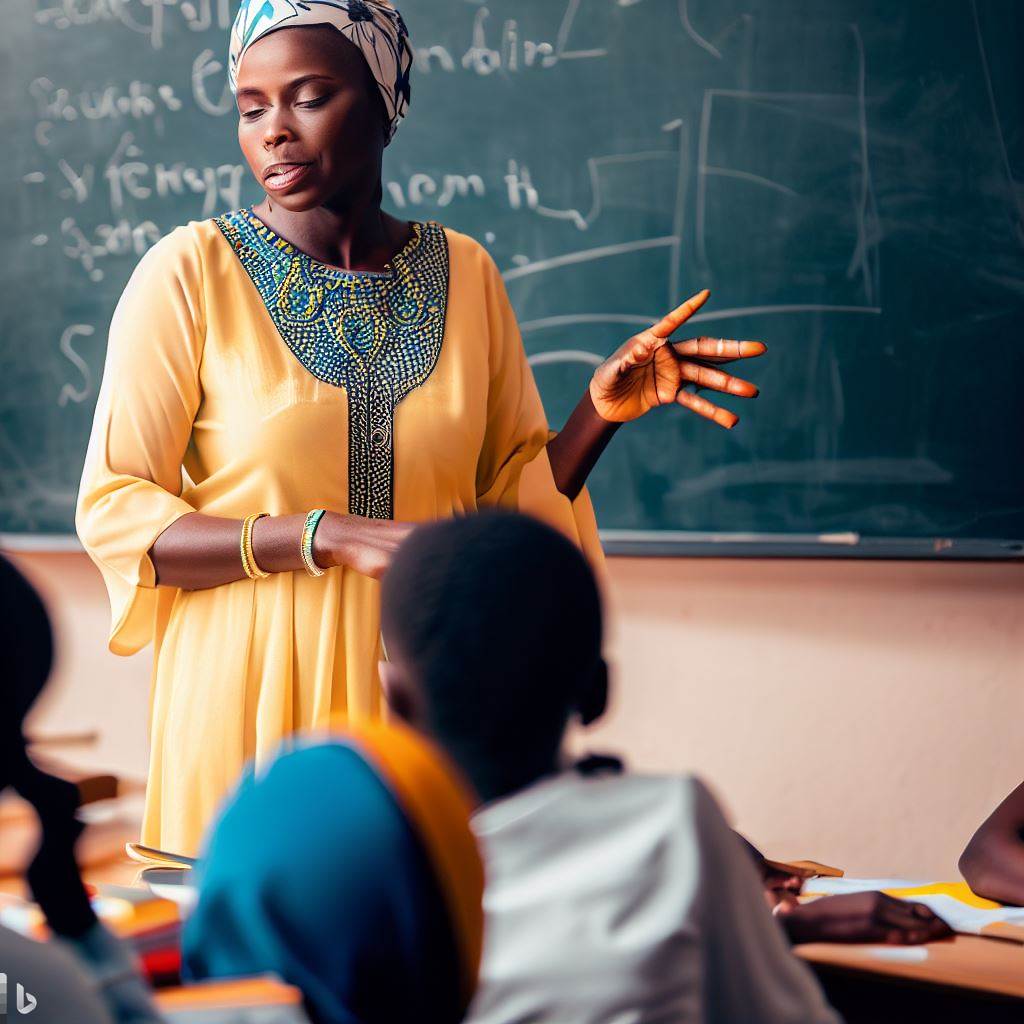Introduction to Financial Literacy and Its Importance in Nigerian Communities
Defining Financial Literacy
Financial literacy means understanding how money works in daily life.
It involves managing finances.
It involves budgeting.
It involves saving.
It involves investing wisely.
Hence, individuals make informed decisions about their economic resources.
Current Financial Challenges in Nigerian Communities
Many Nigerian communities face difficulty accessing financial knowledge.
This lack of knowledge limits their ability to escape poverty cycles.
Moreover, limited understanding of banking and credit systems restricts growth.
Consequently, people rely heavily on informal and often costly financial methods.
Positive Impact of Financial Literacy on Households
Financial education empowers families to plan and control their expenses.
It encourages saving for emergencies and future investments.
Therefore, households can reduce debt and improve their economic stability.
For instance, traders in Lagos who understand finance grow their businesses steadily.
Community Benefits of Enhanced Financial Knowledge
Communities with financial literacy programs experience improved economic participation.
Your Personalized Financial Plan
Get expert financial advice tailored exclusively to your goals. Receive a custom roadmap in just 1-3 business days.
Get StartedPeople start local savings groups and cooperative societies to pool resources.
Such collective efforts boost small-scale entrepreneurship and job creation.
Additionally, knowledge about credit and insurance lowers vulnerability to shocks.
Role of Government and Organizations in Promoting Financial Literacy
The Nigerian government partners with institutions to increase financial awareness.
Nonprofits like the Lagos Money Academy offer workshops tailored to local needs.
Furthermore, fintech companies such as Wema Finance develop accessible learning platforms.
These initiatives bridge gaps between formal financial systems and underserved populations.
Long-Term Importance of Financial Literacy
Building financial skills creates sustainable wealth and reduces poverty profoundly.
Younger generations benefit by gaining early exposure to money management practices.
Ultimately, financial literacy drives community resilience and economic growth nationwide.
Current State of Poverty in Nigerian Communities and Associated Challenges
Overview of Poverty Levels in Nigeria
Many Nigerian communities face severe poverty that limits their growth and development.
Recent studies show that over 40% of Nigerians live below the poverty line.
Rural areas experience higher poverty rates compared to urban centers.
Poverty affects access to basic needs such as food, healthcare, and education.
Unlock a Debt-Free Future with Our Unique Strategies
Imagine a life unburdened by debt—a reality we help you visualize and achieve. We offer personalized strategies tailored to your unique situation, guiding you step-by-step toward financial freedom.
Start TodayEconomic inequality deepens the divide between rich and poor populations.
Key Challenges Contributing to Persistent Poverty
Unemployment and Underemployment
High unemployment rates significantly contribute to widespread poverty.
Many young Nigerians struggle to find stable jobs due to limited opportunities.
Underemployment forces individuals into low-paying, informal sector jobs.
This situation reduces household incomes and limits financial security.
Lack of Access to Quality Education
Limited educational resources hinder skill development in impoverished communities.
Inadequate schooling facilities discourage consistent attendance and learning.
Many youths lack the qualifications needed for better jobs.
This educational gap perpetuates the cycle of poverty over generations.
Inadequate Healthcare Facilities
Poor access to healthcare services exacerbates poverty-related health challenges.
Illnesses reduce the ability to work and increase medical expenses.
Families often face unpredictable costs, pushing them deeper into poverty.
Malnutrition and poor sanitation remain prevalent in many areas.
Limited Financial Inclusion
Many Nigerians lack access to formal banking and financial services.
Unlock Untapped Nigerian Wealth with Our Expert Advice
Imagine accessing investment opportunities others overlook—stocks, bonds, real estate, small businesses tailored to you. We offer personalized advice you won't find elsewhere, guiding you to financial success.
Unlock WealthThis restriction prevents them from saving money or obtaining credit.
Without financial tools, starting or expanding small businesses becomes difficult.
Economic growth stalls and poverty continues unabated.
Social and Environmental Factors Worsening Poverty
Conflict and Insecurity
Ongoing conflicts displace many communities and destroy livelihoods.
Insecurity disrupts farming and trade, reducing income sources.
Displaced families often lose assets and face increased vulnerability.
These conditions undermine community stability and poverty reduction efforts.
Climate Change and Environmental Degradation
Changing weather patterns affect agricultural productivity in rural areas.
Soil erosion and desertification reduce farming land availability.
These environmental challenges threaten food security and income generation.
Communities face higher risks of poverty as natural resources dwindle.
Major Challenges Affecting Poverty Reduction Efforts
- High unemployment and lack of stable work opportunities
- Insufficient access to quality education and vocational training
- Poor healthcare infrastructure and unmet medical needs
- Limited availability of financial services and credit
- Impact of conflict and displacement on livelihoods
- Environmental threats reducing agricultural productivity
How Financial Literacy Improves Budgeting and Money Management Skills
Enhancing Budgeting Abilities
Financial literacy empowers individuals to create realistic budgets based on their incomes.
By understanding income and expenses, people like Chika Amaefule manage money more effectively.
Moreover, they learn to prioritize essential expenses over non-essential spending.
Thus, they avoid unnecessary debts and build savings gradually.
In communities such as Enugu and Jos, budgeting workshops have improved household financial stability.
Strengthening Money Management Practices
Financial education teaches Nigerians how to track their daily spending habits.
For example, traders in Lagos market now use simple expense logs to monitor their cash flow.
Consequently, they identify spending leaks and adjust accordingly to prevent waste.
Furthermore, money management skills encourage disciplined saving for unexpected expenses.
Maryam Suleiman, a micro-entrepreneur in Kano, now saves part of her profits weekly.
Building Confidence in Financial Decision Making
With improved financial knowledge, individuals make better decisions about loans and investments.
They understand interest rates and repayment terms before borrowing money from local lenders.
Therefore, they avoid exploitative loan conditions and reduce risks of default.
Financial literacy programs by firms like Amaka Financial Services offer practical guides on these topics.
This empowerment leads to stronger economic participation within Nigerian communities.
Practical Tools and Techniques for Budgeting
Financially literate individuals often use budgeting templates to plan monthly expenses.
These templates help break down income into categories such as food, education, and transport.
Community centers in Abuja distribute these easy-to-follow budgeting tools regularly.
Additionally, mobile applications tailored for local users improve accessibility to budgeting help.
For instance, the app “MyWallet Naija” supports everyday money management in multiple Nigerian languages.
Encouraging a Culture of Financial Responsibility
Financial literacy promotes a culture where people discuss money management openly.
This dialogue occurs within families and community groups, reducing financial misinformation.
Leaders like Emeka Obi host forums encouraging youths to save and plan financially.
Such community practices foster collective progress toward poverty reduction.
Eventually, financial discipline becomes a shared value that sustains economic growth.
See Related Content: How to Teach Financial Literacy to the Next Generation
Role of Financial Education in Promoting Savings and Investment Habits
Importance of Financial Education in Nigerian Communities
Financial education empowers individuals to manage their money wisely.
It helps community members understand the benefits of saving and investing.
Moreover, it reduces reliance on informal and often unreliable financial sources.
As a result, people gain confidence in making sound financial decisions.
Training programs led by institutions like Lagos Financial Literacy Initiative have proven effective.
How Financial Education Encourages Savings
Financial education highlights the importance of building a savings habit.
In addition, it teaches how small, regular savings can grow over time.
Workshops conducted by organizations such as Tafida Savings Group promote disciplined saving behaviors.
Consequently, individuals become prepared for unexpected expenses and emergencies.
This preparation enhances financial stability and reduces poverty risks.
Fostering Investment Understanding and Participation
Financial education introduces various investment options available locally.
It explains risk and return, enabling informed investment choices.
For instance, programs by the Niger Delta Financial Empowerment Center have increased local investments.
Additionally, education encourages long-term thinking beyond immediate consumption.
Therefore, communities gradually accumulate wealth and generate additional income.
Practical Steps to Strengthen Savings and Investment Habits
Promote consistent financial literacy workshops across rural and urban areas.
Encourage community cooperatives to share knowledge and pool resources.
Implement mobile banking solutions to simplify saving and investing.
Leaders like Amina Yusuf offer mentorship and real-life success stories.
Furthermore, partnerships with local banks increase access to financial products.
Impact of Developing Financial Habits on Poverty Reduction
Regular saving and investing create pathways out of poverty.
These habits increase individual financial resilience and economic opportunities.
Communities with strong financial skills experience improved living standards.
Investment in education and small businesses flourishes as a result.
Ultimately, financial education plants seeds for sustainable economic growth.
Uncover the Details: The Role of Digital Tools in Financial Literacy Education
Impact of Financial Literacy on Access to Credit and Financial Services
Enhancing Understanding of Financial Products
Financial literacy enables individuals to comprehend various financial products better.
People like Amina Musa in Kaduna can select suitable loan options.
They avoid predatory lending and unfavorable terms as a result.
Financial knowledge helps entrepreneurs such as Chinedu Okeke navigate banking systems.
They confidently apply for business accounts and lines of credit.
Reducing Barriers to Formal Financial Services
Many Nigerians face challenges accessing banks due to mistrust and lack of knowledge.
Increased financial literacy builds trust in formal financial institutions.
Adeola Balogun’s cooperative group gained confidence using microfinance banks.
Well-informed individuals understand necessary documentation, easing application processes.
Communities transition from informal savings to regulated financial services as a result.
Empowering Informed Credit Decisions
Understanding credit terms prevents over-indebtedness and financial stress.
Oluwaseun Adeyemi successfully negotiated microloans after learning interest rate calculations.
Borrowers make sustainable repayment plans consequently.
Financial literacy encourages saving to meet collateral requirements.
Thus, access to affordable credit increases for low-income households.
Promoting Use of Digital Financial Services
Financial literacy improves adoption of mobile banking and digital wallets.
Kingsley Nwankwo leverages mobile money to receive payments safely and promptly.
People reduce reliance on cash and improve transaction transparency as a result.
Digital services facilitate access to insurance and pension products additionally.
Financial literacy broadens inclusion in Nigeria’s evolving digital economy.
Building Community-Level Financial Networks
Communities like those in Enugu establish rotating savings schemes informed by financial principles.
These networks increase capital availability for members without formal collateral.
Know-how in financial management ensures accountability and sustainability as well.
NGOs often support training to enhance these grassroots financial services.
Financial literacy strengthens social capital and collective economic resilience.
See Related Content: Financial Literacy 101: Key Concepts Nigerians Should Master by 2024
Reducing Vulnerability to Debt Traps Through Improved Financial Knowledge
Understanding Debt Traps in Nigerian Communities
Many Nigerian families face financial challenges that lead them into debt traps.
These traps occur when borrowing costs exceed individuals’ ability to repay loans.
Consequently, borrowers often take new loans to cover existing debts.
This cycle pushes families deeper into poverty and financial instability.
However, improving financial knowledge can break this damaging cycle.
Role of Financial Literacy in Preventing Debt Traps
Financial literacy equips individuals with skills to manage money wisely.
For example, it enables people like Mariam from Kaduna to budget effectively.
Moreover, financial education helps entrepreneurs like Tunde in Ibadan avoid risky borrowing.
It also teaches how to compare loan options and understand interest rates better.
Therefore, communities become less susceptible to predatory lending practices.
Practical Strategies Enabled by Financial Education
Financial literacy encourages individuals to plan for emergencies instead of borrowing impulsively.
Additionally, it promotes the habit of saving regularly, even in small amounts.
People learn to distinguish between essential expenses and luxury spending.
Consequently, individuals like Fatima in Lagos can reduce unnecessary debts.
It also supports the use of formal financial services that offer fair conditions.
Empowering Local Institutions and Organizations
Local NGOs like Bright Future Initiative provide financial literacy workshops.
These organizations tailor programs to meet specific community needs.
Furthermore, microfinance institutions educate clients to make sustainable borrowing decisions.
Such partnership efforts increase community resilience against debt exploitation.
Ultimately, improved financial knowledge empowers entire neighborhoods economically.
Advancing Long-Term Financial Stability Through Education
With financial literacy, families can plan for children’s education without excessive borrowing.
They also invest wisely in small businesses, contributing to local economies.
Continuous education helps avoid falling back into past financial mistakes.
As a result, communities experience reduced poverty levels and improved livelihoods.
Financial knowledge, therefore, serves as a powerful tool against debt vulnerability.
Learn More: Why Financial Literacy is the Missing Link for Most Nigerians’ Wealth

Empowering Small Business Owners and Entrepreneurs with Financial Skills
Building Practical Financial Knowledge
Financial literacy equips business owners with essential money management skills.
It helps entrepreneurs make informed decisions about expenses and investments.
For example, Adekunle, a tailor in Lagos, learned how to budget effectively through financial training.
As a result, Adekunle increased his profits and avoided unnecessary debts.
Practical financial knowledge strengthens businesses and promotes sustainable growth.
Enhancing Access to Credit and Funding
Understanding credit options enables entrepreneurs to secure necessary funds wisely.
Grace, who runs a cosmetics shop in Aba, used her financial skills to obtain a microloan.
This loan helped her expand inventory and boost sales.
Better financial literacy reduces risks of loan defaults and improves creditworthiness.
Informed borrowing supports business development and community economic stability.
Improving Record-Keeping and Accountability
Financial literacy encourages consistent record-keeping among small business owners.
For example, Tunde uses bookkeeping techniques to track his food stall’s daily income.
This practice helps identify profitable products and control costs.
Transparent records build trust with customers and potential investors.
Accountability in finances encourages business professionalism and growth.
Promoting Strategic Planning and Risk Management
Entrepreneurs learn to plan budgets and forecast potential challenges effectively.
Chinaza, a hairstylist in Enugu, prepares monthly financial plans to manage her salon.
She also saves emergency funds to handle unexpected expenses.
Financial literacy enables better risk management and long-term stability.
Strategic planning prepares business owners to adapt in changing economic environments.
Government and NGO Initiatives Supporting Financial Literacy Programs
Government Efforts to Enhance Financial Literacy
The Central Bank of Nigeria actively promotes financial education nationwide.
It partners with state governments to implement community-based training.
Moreover, the Ministry of Finance funds several outreach programs targeting rural areas.
These initiatives focus on teaching budgeting, saving, and prudent borrowing.
Additionally, digital platforms are developed to broaden access to financial knowledge.
The government ensures collaboration with microfinance institutions for inclusive financial services.
Role of Non-Governmental Organizations
NGOs such as the Bright Future Foundation lead grassroots financial literacy campaigns.
They organize workshops that empower women and youth in underserved communities.
Such groups also provide tailored training on entrepreneurship and credit management.
Furthermore, partnerships with local banks help connect communities to affordable financial products.
NGOs leverage mobile technology to deliver financial tips to remote populations.
They continuously monitor and evaluate the effectiveness of their education programs.
Collaborative Initiatives for Broader Impact
Government agencies and NGOs frequently collaborate for larger-scale programs.
Joint projects often include financial literacy seminars combined with microcredit access.
These collaborations maximize resource utilization and extend the reach of training.
For example, the Lagos Financial Empowerment Project combines efforts from various stakeholders.
This program supports small businesses and encourages savings clubs within communities.
Consequently, more Nigerians gain confidence in managing their personal finances effectively.
Successful Financial Literacy Programs in Nigerian Communities
The Umuahia Community Savings and Loans Initiative demonstrates great success.
Under this program, locals receive practical lessons on investment and risk management.
Its impact includes improved household incomes and reduced dependency on high-interest lenders.
Similarly, the Delta State Youth Finance Academy targets young entrepreneurs.
Participants develop skills that increase their business resilience and financial independence.
These programs showcase the positive role financial literacy plays in poverty reduction.
Case Studies Demonstrating Poverty Reduction Through Financial Literacy in Nigeria
Empowering Women Entrepreneurs in Lagos
Financial literacy programs have significantly empowered women entrepreneurs in Lagos.
The Women Finance Initiative trained Olufunke Adeyemi and her peers.
They learned budgeting, saving, and access to microcredit services.
Consequently, Olufunke expanded her tailoring business successfully.
Moreover, her household income increased, improving her family’s living standards.
The initiative also fostered community savings groups supporting local startups.
Thus, financial education clearly helped reduce poverty among women in Lagos.
Enhancing Agricultural Productivity in Kaduna
Financial literacy in Kaduna has improved farmers’ access to credit and investments.
Isaac Danjuma received training from the Kaduna Rural Finance Project.
He learned how to manage farm revenue and plan for agricultural inputs.
As a result, Isaac purchased modern equipment and increased crop yields.
In addition, his improved financial skills enabled him to save for harvest seasons.
These changes strengthened his financial stability and reduced poverty risks.
Such success stories demonstrate the vital role of financial literacy in rural Nigeria.
Microfinance Initiatives Supporting Small Businesses in Port Harcourt
Microfinance institutions in Port Harcourt integrate financial education with lending services.
Chinwe Nwosu benefited from AccessGrowth Microfinance’s literacy workshops.
She mastered bookkeeping, loan management, and strategic business planning.
Consequently, Chinwe expanded her food production enterprise sustainably.
Her increased profits allowed reinvestment and employment of local youths.
Ultimately, this boosted both her income and community economic growth.
This example highlights how financial literacy enhances microfinance impact sustainably.
Youth Financial Inclusion Programs in Abuja
Youth-focused financial literacy programs in Abuja promote saving culture and entrepreneurship.
The NextGen Finance Project trained Emeka Okafor on financial planning.
He learned about budgeting, digital banking, and investment basics.
Thus, Emeka started a tech repair business leveraging digital payments.
His disciplined money management ensured steady growth and reduced income vulnerability.
Furthermore, financial literacy helped Emeka avoid debt and build savings.
These outcomes show how youth education combats poverty by fostering economic independence.
Community-Based Savings Groups in Enugu
In Enugu, community savings groups teach members about financial discipline and credit use.
Maria Eze joined a village savings group supported by the Enugu Finance Hub.
She learned how to contribute regularly and access group loans responsibly.
Over time, Maria invested in a local retail shop and improved her earnings.
Moreover, group members share knowledge, reinforcing prudent financial habits.
Such collective financial literacy initiatives lift entire communities out of poverty.
This model exemplifies sustainable poverty reduction through collaborative education.
Challenges in Implementing Financial Literacy
Limited Access to Quality Educational Resources
Many Nigerian communities lack access to reliable financial literacy materials.
Additionally, most available resources do not address local economic realities.
Therefore, learners often find the content irrelevant or difficult to apply.
Furthermore, the scarcity of trained educators worsens this challenge.
Consequently, outreach programs with well-adapted materials remain insufficient.
Cultural and Language Barriers
Diverse languages in Nigeria present obstacles to delivering financial literacy effectively.
Moreover, some cultural beliefs discourage open discussions about money management.
These factors limit participation and reduce the impact of training sessions.
Thus, failing to consider cultural contexts hinders engagement and learning.
Low Financial Inclusion Levels
Many individuals in rural areas lack access to banking and formal financial services.
This circumstance reduces opportunities to practice financial skills learned.
Besides, mistrust of financial institutions keeps people away from financial products.
Consequently, low financial inclusion restricts the benefits of literacy programs.
Inadequate Government and Private Sector Support
Financial literacy initiatives often suffer from inconsistent government funding.
Likewise, private companies rarely invest adequately in community education programs.
As a result, these initiatives struggle with sustainability and reach.
Thus, many targeted communities are left underserved or unreached.
Strategies to Overcome Challenges
Developing Locally Relevant Educational Content
Collaborating with local experts ensures financial materials suit community needs.
Additionally, integrating examples from day-to-day life makes learning relatable.
Organizations like GreenPath Financial include regional scenarios in their programs.
This approach promotes better understanding and practical application.
Leveraging Multilingual and Culturally Sensitive Approaches
Programs must use native languages to improve communication and comprehension.
Furthermore, incorporating cultural values increases participant trust and involvement.
Community leaders like Amina Yusuf have championed localized workshops successfully.
These efforts foster openness and encourage knowledge sharing within communities.
Enhancing Financial Inclusion through Partnerships
Partnering with microfinance institutions opens access to banking for underserved groups.
For example, Safepay Microfinance offers accessible financial products alongside training.
Moreover, mobile banking platforms like Kudi expand reach in remote areas.
These tools enable learners to implement their skills in real financial settings.
Strengthening Collaboration between Stakeholders
The government should increase funding commitment for financial literacy nationwide.
Private enterprises can sponsor education programs as part of corporate social responsibility.
An alliance between Lagos State Ministry of Finance and Zenith Bank boosted recent campaigns.
Such partnerships ensure program continuity and maximize community impact.
Using Technology for Wider Reach
Deploying mobile apps and radio programs can overcome physical access limitations.
Innovators like Chinedu Okeke develop user-friendly apps tailored to Nigerian audiences.
Additionally, broadcasting in local dialects on rural stations increases awareness.
Technology thus supplements traditional methods effectively and efficiently.
Additional Resources
Junior Achievement Nigeria – Ogun state is not left out! Get your …
A Sample Proposal “Financial Literacy Programs for Poverty …




